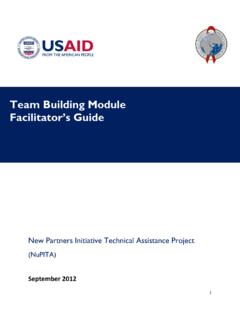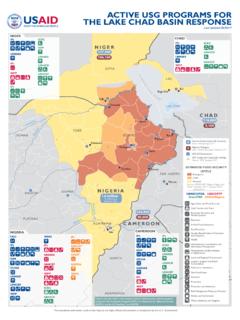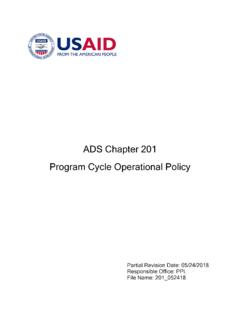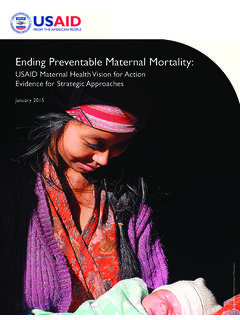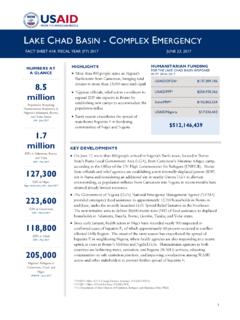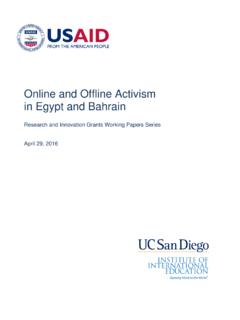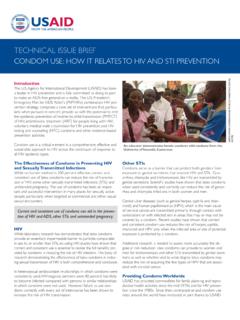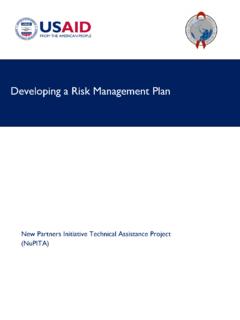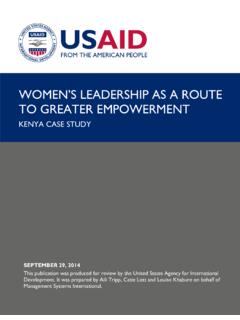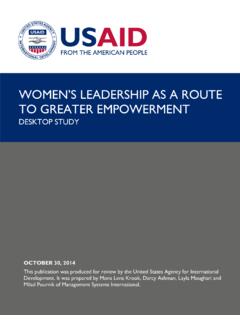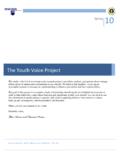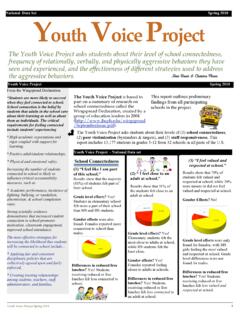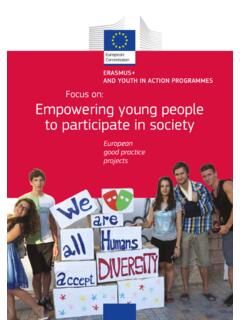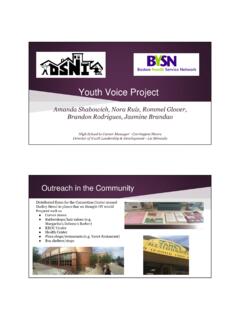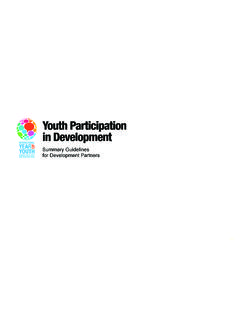Transcription of Gender Analysis for USAID/Rwanda Valuing Open …
1 Gender Analysis for USAID/Rwanda Valuing Open and inclusive Civic engagement project january 2015 external VERSION Introduction The Government of Rwanda (GOR) has made great strides in developing policies and strategies to support women s empowerment and the advancement of Gender equality, and numerous mechanisms have been instituted to support their implementation. Nevertheless, Rwandan women continue to face equality challenges. Women in positions of authority tend to carry less influence than their male counterparts. Further, while two-thirds of parliamentarians in Rwanda are women, a large share of women in Rwanda experience intimate partner violence (56 percent).1 The existing inequalities and persistent lack of voice and agency for Rwandan women as members of society require consistent and long-term emphasis and action, particularly in civil society, to bring about change.
2 This Analysis identified Gender issues that pose barriers to specific civil society and civic engagement outcomes, as well as opportunities to empower women and advance Gender equality through broader democracy and governance activities. Key findings include: The multiple demands placed on women from professional, personal and family responsibilities are the foremost barriers to women s participation in civic life and civil society. Social norms, Gender roles, and stigmas also limit women s voice and participation in civic life. Lack of education, skills and/or confidence contributes to low participation by women in civil society. Unequal levels of decision-making and high levels of Gender -based violence often dissuade women from participating in civic activities and civil society. Recommendations specific to each outcome of the Valuing Open and inclusive Civic engagement ( voice ) results framework are detailed in the Analysis and should be considered when designing activities under this project .
3 The following are overarching recommendations to consider as separate activities or across multiple activities: Civil society organizations (CSOs) are active in Rwanda but they struggle to effectively monitor programs, rigorously analyze data and collaborate with each other. To help improve and extend the impact of CSOs, especially within the realm of women s 1 USAID/Rwanda . Rwanda Demographic and Health Survey: 2000 - 2010. Ministry of Health, Kigali, 2010. 1 empowerment, USAID/Rwanda can build CSOs capacity by: providing training to improve their ability to conduct evidence-based advocacy; supporting efforts to build community platforms and coordination programs; and enhancing CSOs Gender -mainstreaming and integration skills. Social norms and traditional Gender roles have hindered Rwandan women s empowerment process.
4 USAID/Rwanda can support activities that guide community leaders to realign traditional values, cultural perceptions, and roles of men and boys to further the protection of women s rights and human rights in general. To further women s empowerment, USAID/Rwanda can engage with CSOs that offer trainings, especially to youth and men, on the core characteristics of human rights and the meaning and benefits of Gender equality to the household and society. The differences in experience, skills and confidence between male and female citizens need to be overtly addressed through specific interventions from the start. USAID/Rwanda can support CSOs to enhance Gender integration and incorporation of Gender -aware practices in programs from the outset to target specific skill and confidence issues for women as well as the differences in skills between women and men.
5 Background This Gender Analysis was conducted from August to October 2014 and is intended to inform the design of the voice project and subsequent activities and implementing mechanisms. This Gender Analysis is one of the three required analyses that inform the voice project , and the findings of this Analysis are integrated into the project document. This document builds on existing Gender assessments and discussions with the USAID/Rwanda Democracy and Governance (DG) Office, the Mission Gender Team and Gender specialists in the Government of Rwanda (GOR), non-governmental organizations (NGOs), civil society organizations (CSOs), and development partners during stakeholder consultations in Rwanda. According to the Global Gender Gap Report 2014 (a yearly index that measures variables related to women s economic participation and opportunity, education, political empowerment, and health and survival), Rwanda is ranked seventh in the world for Gender However, the Rwanda Economic Development and Poverty Reduction Strategy II 2013-2018 (EDPRS II) states that the Rwandan economy will be more productive when all women and men are full participants.
6 Even though women in Rwanda represent 52 percent of the population, they do not participate fully in socio-economic and political spheres of life. Of particular relevance for the voice project activities are the relative poverty and illiteracy of women, the extra workload burden on women and the relative lack of economic opportunity. Childcare responsibilities, domestic partner violence and cultural norms pertaining to household decision-making and civil society participation may also affect the proposed A 2011 survey cited that 70 percent of respondents believe civil society plays a significant role in Gender equality promotion in Rwanda s National Action Plan on Women, Peace and Security (2009-2012) mentions the strong ties CSOs have developed throughout the country and their contribution to advocacy of Gender and women s empowerment promotion.
7 The National 2 Nizeyimama, Jean. Rwanda is Ranked Seventh by the Global Gender Gap Report for Gender Equality. UMUSEKE. 28, October, 2014. Web. 3 Republic Of Rwanda. "Economic Development and Poverty Reduction Strategy, 2013-2018: Shaping Our Development." 4 Ibid. 2 Action Plan included specific targets for civil society, as well as government ministries, to focus on Gender mainstreaming and women s political empowerment, including training courses on Gender budgeting for Reviews of progress on the 2009-2012 Rwandan NAP indicate that the GOR could benefit from consolidating related efforts across government entities and that while CSOs have contributed to gains for women in Rwanda, CSOs should carry out more robust advocacy campaigns and more rigorously monitor national government activity on implementation and enforcement of relevant legislation to ensure women s participation at all This Gender Analysis will try to respond to the following questions with the aim of promoting Gender equality throughout the voice project interventions.
8 1) Where are the key entry points for civil society and women-focused civil society organizations for vulnerable populations, including women and girls, people with disabilities and Lesbian, Gay, Bisexual, Transgender and Intersex (LGBTI) communities, in civic engagement programming? 2) What are the major socio-economic and empowerment issues, including specifics regarding civil rights and liberties, for young women and men? 3) What are the key barriers or gaps to civic and political participation for young women and men? 4) What are the critical entry points for increasing women s voice and participation in society? What, if any, opportunities have been successfully seized in the past? Are there specific opportunities on the horizon between now and the next round of elections? 5) How do traditional and cultural norms or Gender roles affect participation in civic and public life for male and female populations?
9 6) Does domestic partner or sexual Gender -based violence (SGBV) affect women s participation in civil society? If yes, how? 7) How do national policies and strategies create both barriers and entry points to civic and political participation for women, youth populations, and other vulnerable populations? 8) What are the similarities and differences of women s agency and participation in the private sphere compared to the public sphere? 9) What are the barriers, if any, that prevent vulnerable or marginalized populations from accessing or benefiting from public goods/services? 10) What are the major Gender gaps in relation to the voice project that the project activities should seek to address? It is important to note that Rwandan women should not be treated as a homogenous group when analyzing civic participation; in mature democracies, women disagree on policies and desired political Additionally, as meetings with stakeholders reaffirmed, activities will need to develop systematic mechanisms to engage with men and boys in addressing Gender -sensitive political and civic participation issues, especially related to SGBV.
10 (Note: Given USAID/Rwanda s interest in potential future SGBV programming, a separate, more comprehensive Analysis of SGBV issues is 5 Republic of Rwanda. National Action Plan 2009 2012. The United Nations Security Council Resolution 1325/2000 on Women, Peace and Security, May 2010. 6 Global Network of Women Peacebuilders. Security Council Resolution 1325: Civil Society Monitoring Report: Rwanda. Web. 7 "Women in Parliament: Beyond Numbers. A Revised Edition." Ed. Julie Ballington and Azza Karem. Institute for Democracy and Electoral Assistance, 2005. Web. 3 included as Annex A). Activities will also need to develop systematic mechanisms through which to engage men, women, and youth in developing youth -sensitive participation issues and inclusive activities across the spectrum of vulnerable populations including person with disabilities (PWDs) and LGBTI communities.
